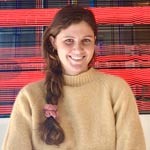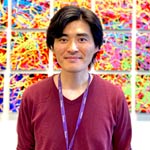
Neuroscience Institute Postdoctoral Fellows
In collaboration with faculty researchers, postdocs at the Neuroscience Institute conduct innovative research to advance biomedical discovery. Learn about their work and how our people, programs, and facilities help them reach their goals.

Ismail Ahmed, PhD—Froemke Lab
Ismail is a native New Yorker hailing from Brooklyn. He received a BS in biochemistry from The City College of New York and did his PhD in biochemistry and molecular biophysics with Feng Gai, PhD, at the University of Pennsylvania. His thesis work focused on developing and applying unnatural amino acid–based probes for biological spectroscopy and microscopy. Currently, Ismail is a postdoctoral fellow in the laboratory of Robert C. Froemke, PhD. Ismail is interested in how neuropeptides modulate neural circuits giving rise to complex behaviors, such as social behavior. Specifically, he is integrating his chemical biology expertise with classical neuroscience techniques to develop novel tools to better understand the neuromodulatory role of the neurohormone oxytocin in the context of rodent maternal behavior. Ismail’s work is generously funded by an F99/K00 award through the National Institute of Mental Health. In addition to his scientific work, Ismail is an active member in diversity, equity, and inclusion efforts and has established a new talk series at the Neuroscience Institute titled BioDiverseStory: The Life and Science of BIPOC Researchers. When Ismail is not in the lab, you can find him spending time with family, traveling, and hunting for New York City’s best Halal carts.

Melissa Hernández-Frausto, PhD—Basu Lab
Melissa completed her BS with a major in pharmaceutical chemistry in her hometown Zacatecas, a small city in northeast Mexico. She then moved to Mexico City where she pursued her graduate studies in neuroscience obtaining an MS and PhD at the Center for Research and Advanced Studies of the National Polytechnic Institute (CINVESTAV), one of the most prestigious research centers in Mexico and Latin America. There, she specialized in behavioral tasks in freely moving animals to assay in cognition and synaptic impairments in neuropsychiatric models. As a postdoctoral fellow in the lab of Jayeeta Basu, PhD, she has established fiber photometry coupled with cognitive tasks in freely moving rodents. Her research interests focus on understanding the roles of the diverse phenotypes from entorhinal cortex inputs into the hippocampus while rodents execute freely moving behaviors. Her goal is to decode the functionality of these projections and their outstanding contribution to episodic memory, and how these inputs may be involved in neuropsychiatric diseases, including Alzheimer’s disease. Outside the lab, she enjoys walking and biking around the city chasing and looking for delicious Mexican restaurants.

Lua Koenig, PhD—He Lab
Lua grew up between France and Ireland. She completed her BA in neuroscience at Trinity College Dublin, then trained in the lab of Axel Cleereman, PhD, at the Université Libre de Bruxelles in Belgium. In 2015, she joined the lab of Tony Ro, PhD, at The Graduate Center of The City University of New York to pursue her PhD. There, she studied the neural mechanisms of conscious perception in humans, using brain stimulation (transcranial magnetic stimulation) and neuroimaging (electroencephalography, fast-signal optical imaging, and fMRI). For her thesis, she focused on unconscious perception, that is, cases in which stimuli are not detected yet can be shown to influence behavior. On this line of research, she published two articles: Koenig and Ro (2019) in Neuropsychologia focuses on the pathways utilized in unconscious vision, and Ro and Koenig (2021) in Psychological Science investigates the neural mechanisms of unconscious touch perception. In 2021, she joined the lab of Biyu J. He, PhD, as a postdoctoral fellow, where she is currently studying how spontaneous internal neural processes interact with stimulus-driven neural processes to give rise to visual perception, using magnetoencephalography and fMRI. In her free time, Lua loves to cook and practice yoga.

Christina May, PhD—Nagel Lab
Christina enjoys exploring. She grew up by the beach in Charleston, South Carolina, and then moved to Dallas for her BS in neuroscience from the University of Texas at Dallas, and then to Ann Arbor for her PhD in neuroscience from the University of Michigan. She now lives on Roosevelt Island in the East River. Her past research has spanned studying mechanisms of alcoholism in mice and the effects of sugary food on taste and reward in flies. As a postdoc, she is pursuing her lifelong dream of doing space-related research. In the lab of Katherine Nagel, PhD, she seeks to understand how 3D force vectors, like wind and gravity, are represented and utilized for navigation in the brains of flying insects. She hopes her research will guide therapeutics for movement and navigation disorders, as well as inform human exploration of non–Earth gravity environments. Her work is supported by a Leon Levy Fellowship in Neuroscience, which recognizes early-career neuroscientists at NYU who are performing cutting-edge research. Outside of the lab, she enjoys biking around New York City with her partner and playing with their adorable golden retriever, Whisky.

Takashi Yamaguchi, PhD—Lin Lab
Takashi is a postdoctoral fellow in the laboratory of Dayu Lin, PhD. He received his PhD in neuroscience from Osaka University. In his doctoral studies under the supervision of Shigetada Nakanishi, MD, PhD, he studied how neural circuits control distinct emotional behaviors using genetic manipulation and in vivo recording tools. He identified two parallel septo-habenular pathways as an evolutionarily conserved control of differential emotional behaviors (Yamaguchi et al., Neuron, 2013). Takashi also developed an in vivo microendoscopic system to monitor neuronal signals from freely moving animals during learning tasks and social contexts (Isosaka et al., Cell, 2015; Yamaguchi et al., PNAS, 2015). For his postdoctoral research in Dr. Lin’s lab, he is exploring how complex social behaviors are orchestrated at the circuit level. Last year, Takashi showed that two molecularly and spatially distinct subpopulations in the posterior amygdala, sending excitatory inputs into distinct hypothalamic regions, play a key role in determining the timing of behavior initiation during mating and fighting in male mice. This work was featured as the cover image and article in the September 2020 issue of Nature Neuroscience. His future projects aim to use an intersectional approach to study the neural mechanisms underlying behavioral states in social contexts. For his excellent work during both his doctoral and postdoctoral training, he was selected as a recipient of the Japan Neuroscience Society Young Investigator Award in 2021. In his free time, he enjoys cooking Japanese cuisine and playing the violin.

Yunlu Zhu, PhD—Schoppik Lab
Yunlu studies the neural circuits underlying balance control in the context of neurodegenerative diseases. Specifically, his work in the lab of David Schoppik, PhD, focuses on progressive supranuclear palsy, which is a tau-protein disorder that causes frequent falls in patients starting from the early stage of the disease. With this project, Yunlu strives to understand how biochemical dysfunction, such as ectopic aggregation of tau protein and neurofibrillary degeneration, leads to balance disorders. Yunlu has generated a novel zebrafish model for tauopathy, which allows him to investigate disease mechanisms across molecular, cellular, circuit, and behavior levels. Yunlu earned his PhD from the University of Virginia, where he studied glia and neurodevelopment while accidentally discovering novel roles of neural crest cells in phagocytosing dead cells during neurogenesis. His long-term interest is to understand how neurons and glia assemble into functional circuits and how molecular and cellular dysfunctions disrupt behavior in disease. Yunlu received the Dent Award and the Fleming Prize for outstanding dissertation during his PhD and has been recently awarded the Leon Levy Fellowship in Neuroscience. Yunlu always carries a camera with him and does street photography on his daily commute.
